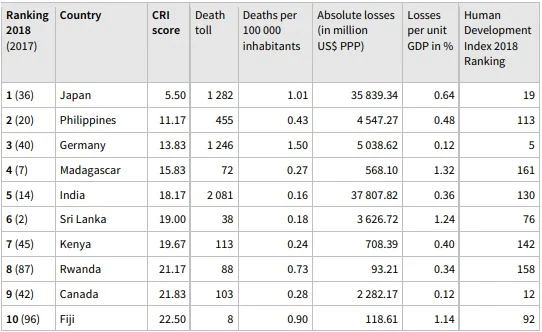 |
| 10 most effected countries in the world. CRI: Climate Risk Index |
A top development and environmental organization, based in Bonn, Germany, has raised the alarm that India is the fifth “most affected”, following Japan, the Philippines, Germany and Madagascar, by damage as a result of heatwaves. Pointing out that India, along with nine other countries suffered from “extended periods of heat” in 2018, the body, German Watch, insists, there is “a clear link between climate change and the frequency and severity of extreme heat.”
Claiming to be committed to sustainable global development, the German Watch report, “Global Climate Risk Index 2020 Who Suffers Most from Extreme Weather Events?” , prepared by David Eckstein, Vera Künzel, Laura Schäfer, Maik Winges, says that one of the major impact of climate change could be seen during “the yearly monsoon season, lasting from June to September”, severely affecting India in 2018.
“The state of Kerala was especially impacted – 324 people died because of drowning or being buried in the landslides set off by the flooding,30 the worst in one hundred years. Over 220,000 people had to leave their homes, 20 000 houses and 80 dams were destroyed”, the report says, adding, “The damage amounted to EUR 2.4 billion (US$ 2.8 billion).”
“Furthermore”, the report says, “India’s east coast was hit by the cyclones Titli and Gaja in October and November 2018. With wind speeds of up to 150 kilometres per hour, cyclone Titli killed at least eight people and left around 450,000 without electricity.”
Citing a “regional model” used to analyse the occurrence of heatwaves in India, and looking into “causalities regarding the 2016 heatwave and climate change.”, the report says, “The model indicated that sea surface temperatures influence the likelihood of recordbreaking heat.”
“In India, temperatures of up to 50°C were measured, the extreme water stress was omnipresent. Due to the drought in the southern Indian state of Tamil Nadu and empty water reservoirs, Chennai, a city with over a million inhabitants, could only be supplied with water by trucks and trains. The water supplies for the population had to be accompanied by the police”, the report notes.
According to the report, “India is among those countries that were particularly affected by extreme heat in both 2018 and 2019. Since 2004, India has experienced 11 of its 15 warmest recorded years. Since 1992, an estimated 25 000 Indians have died as a result of heatwaves.”
It continues, “Contributing factors include increasing temperatures, the El Niño Modoki, an irregular El Niño in which the Central Pacific Ocean is warmer than the East Pacific, and the loss of tree cover, reducing shade as well as the moisture in the soil. India is particularly vulnerable to extreme heat due to low per capita income, social inequality and a heavy reliance on agriculture.”
Asserting that the worst hit regions have also been among India's poorest, the report says, “Additionally, a high number of people are working in areas such as agriculture and construction.” Citing a study by the International Labour Organization, it adds, “by 2030, India would lose 5.8% of its working hours due to heat stress, which is equivalent to 34 million full-time jobs out of a total of 80 million worldwide.”
Pointing out that the indicator “absolute losses in US$” is identified by purchasing power parity (PPP), which expresses more appropriately how people are actually affected by the loss of US$ 1, the report says, “A farmer in India can buy more crops with US$ 1 than a farmer in the USA with the same amount of money.” As a result, it is safe to conclude that as a result, the nominal damage to Indian farmers “are much higher in India.”

Comments